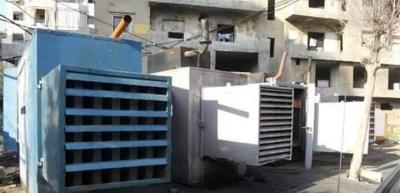The residents of the southern suburbs had high hopes in late July after the launch of new security campaigns led by the "State Security" agency, aiming for two main objectives: to require generator owners to install meters for users and to adhere to a fair pricing system for the kilowatt hour. However, the outcome of the campaign did not match the residents' expectations regarding the bills they anticipated receiving. Standards for pricing electricity were still absent, and even the currency required for payment was unclear. Some subscription owners fully adhered to the pricing issued by the Ministry of Energy for July 2022 (13,545 pounds/kilowatt), while the majority refused to comply. The degrees of non-compliance were also vague and arbitrary, with some raising the kilowatt price by an additional 1,000 pounds, while others increased it to 19,000. Some even added an extra 100,000 pounds to the fixed charge for the meter specified by the Ministry of Energy's decision at "100,000 pounds for a 5-amp subscription and 220,000 pounds for a 10-amp subscription." Others went further with pricing that relied solely on foreign currency for payment, setting the cost of the kilowatt at 0.46 cents, and the fixed meter charge fluctuating between 5 and 10 dollars. This is just a glimpse of the events at the beginning of this month (August 2022) in the southern suburbs. The urgent need for electricity drives people to change their residences, with one family head moving to another neighborhood where the electrical supply is more stable and the price "is friendlier to the wallet."
Residents in this area recount stories akin to spy films. Generator owners evade accountability using various tactics, recording on invoices the phrase "subscription fee" without specifying the nature of the subscription. One invoice does not mention it was issued by an electricity generator owner, sometimes listing a "grocery store" or "printing press" instead. All of this serves one goal: to make complaints about non-compliance more difficult, preventing both residents and security agencies from documenting clear violations. Here, Abbas al-Ghul, a lawyer for the Union of Municipalities in the southern suburbs, mentions that "one of the generator owners is hiding to avoid a complaint against him." He notes that they are "waiting for complaints from the people to take action." He explains the legal channels the union will pursue, as they will provide the magistrate in Baabda with the number of subscribers for each generator, thus "the fine will depend on their profits." Al-Ghul adds that "the judiciary relies on the illegality of generator owners to pursue them, as electricity production in Lebanon is monopolized by Electricité du Liban," a fact affirmed by the State Consultative Council in decision number 190/2019, which dismissed the generators' owners' appeal against the Ministry of Economy's decision regarding their profit declaration mechanism.
The Union of Municipalities in the southern suburbs urges subscribers to contact specific numbers to file complaints related to generator owners' non-compliance with official pricing. Indeed, one subscriber in the Marjieh area attempts to call in front of us, and after several attempts, he connects to someone on the other end. He listens with much frustration, and at the end of his complaint, instead of taking immediate action or at least recording the issue for follow-up, the person on the line suggests one of three options: to file a complaint at the municipality with his name along with a copy of his ID and a document (the invoice), to go to the Consumer Protection Department in the Ministry of Economy to file a confidential complaint, or to call State Security directly. The subscriber prefers the last option as it is "safer and less costly," and contacts this security agency explaining that he paid 18,000 pounds per kilowatt, in addition to an increase on the fixed subscription. The surprise comes when a State Security officer suggests to the complainant that he "contact the subscription owner and tell him to call him (the security officer), and he will discount 3,000 pounds for each kilowatt"! The complainant feels he has hit a dead end, unable to confront the situation alone, stating that "the generator owners wield power on the ground and have no problem controlling a neighborhood with a single subscriber." He concludes, "No one wants to be that subscriber."
Solar energy has not provided a permanent solution for achieving 24/24 electricity supply. Yes, during peak sunlight hours (from 9 AM to 4 PM in summer), one can forgo all external electricity lines. However, when nighttime arrives, the solar system relies on its stored energy in batteries. For technical and financial reasons related to the size, number, and costs of batteries, not all households benefiting from solar power during the day can extend their supply hours into the night. Consequently, some of these families still rely on subscription services to cover these hours, especially since the need for air conditioning increases at night during the summer.
The shift of homeowners equipped with solar energy to install meters has not satisfied subscription owners, even with extended supply hours. They enforced a return to a cloaked cut-off system by "placing a cutoff on the meter bill." In many neighborhoods of the southern suburbs, and even in some villages, subscription owners impose a monthly consumption charge on the meter. For example, in Ain el-Rummaneh, you must consume at least 50 kilowatt-hours monthly, and in Ghobairi, you are obligated to pay 1.5 million pounds monthly regardless of your actual consumption.




